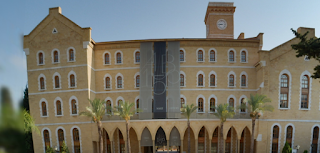
Today, the American University of Beirut bans Jewish students; historically, it welcomed them. (Indeed, some alumni would go on to prominent posts in the state of Israel.) Tamara Berens in Mosaic explains how the school, started by an American missionary, became the crucible of Arab nationalism, itself founded by Arab Christians, and Palestine its signature cause.
At its height in the early 20th century, Jews made up 12 percent of the student population—no small feat in an era when Jews faced restrictive quotas at major universities in America and Europe.
In those days, AUB’s Jewish students made up a vibrant and diverse community, drawn variously from recent Ashkenazi immigrants to the yishuv in Palestine, Iraqi Jews, the mixed Jewish community of Beirut itself, and elsewhere. And Jewish life at AUB was comfortable. Thanks to the availability of kosher food, the proximity to Palestine, and such extras as Hebrew-language instruction courtesy of the campus Jewish club, students were able to maintain their specific identity while benefiting from an excellent liberal-arts education. Jewish graduates of AUB would go on to hold prominent positions in public life, including eventually in the state of Israel.
What kind of school was AUB, and how did it come about? Its origins, in fact, lay outside of the Levant: in the United States, and in the dreams of a Christian missionary.
In 1855, the young Daniel Bliss sailed from Boston to the Ottoman province of Syria. As a student at Amherst College, he had been inspired by the religious dynamism of antebellum America. The Second Great Awakening was bringing thousands of “witnesses” to evangelical meetings centered on the theme of humanitarian service. One sermon in particular, by the Congregationalist minister Samuel Hopkins, struck the young man with its emphasis on Christian love as the cure for “poverty, injustice, and oppression.” To him, this was God’s mission not just for America but for the whole world—and he would be its agent. In his Amherst commencement address in 1852, he foresaw “no finality this side of the gates of the New Jerusalem” until liberty broke out “like day” across the world.

Leave a Reply